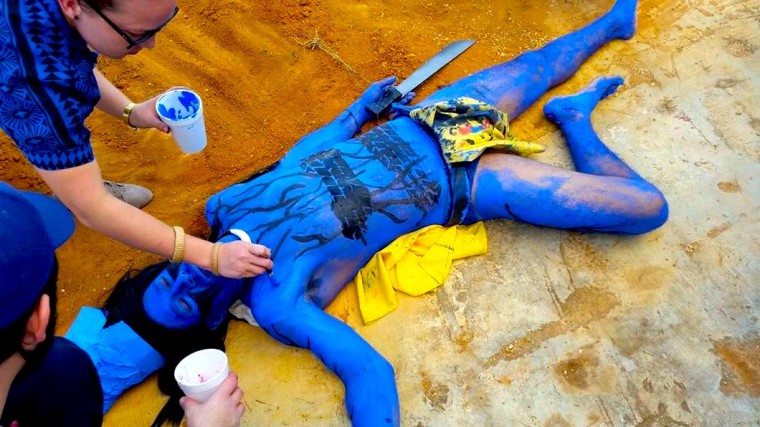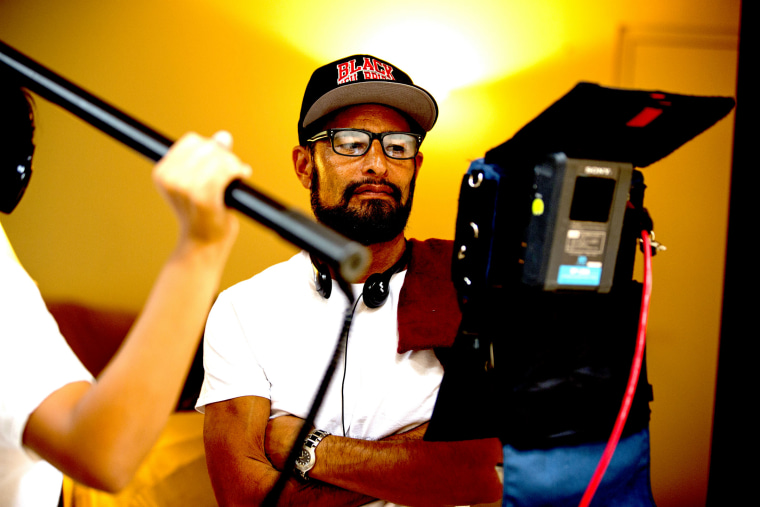In 2000, Alex Muñoz's favorite pair of sunglasses went missing.
After speaking to a group of incarcerated youth about what he did as a filmmaker at a now-closed Southern California correctional facility, he stepped out for a bathroom break and came back to find his glasses were gone.
Muñoz offered the youth a chance to return them without getting into any trouble. He left the room and walked back in a few minutes later.
Three in attendance stood up and confessed they knew where the sunglasses were, Muñoz recalled. They agreed to give them back to Muñoz on one condition: He had to promise to come back and teach them more about filmmaking.
“When I drove home, I realized that that was a cry for help,” Muñoz said. “They wanted to be creative, they want to express themselves, they want to tell their stories their way.”
That encounter inspired Muñoz to establish Films by Youth Inside (FYI Films), a violence prevention program that aims to empower incarcerated youth by teaching them digital filmmaking and life skills. Muñoz began teaching in 2002, and FYI Films became a standalone nonprofit organization in 2011.
“It’s my intention to help educate mainstream society that these kids aren’t going live a criminal life if you give them a chance, if you show them a different path."
A graduate of the University of Southern California's School of Cinematic Arts, Muñoz made the initial decision to visit delinquent youth after a 1999 screening of "Riot," his first feature-length film as a director. The film examined the civil unrest that followed the Rodney King verdict in 1992.
Muñoz said the screening took place at the First African Methodist Episcopal Church in South Central Los Angeles and attracted a group of young black activists who were upset that producers would screen a film about the black community in which they had no input.
“A lot of my producers fled the screening. They thought it might become dangerous” Muñoz recalled. “ You really felt their rage, but they weren’t threatening, they were just talking very loudly.”

At the end of the screening, Muñoz approached the activists, he said, arguing it was unfair for them to accuse all filmmakers of not caring about them, and expressing his concern for disadvantaged communities. They challenged Muñoz to prove he cared by visiting Heman G. Stark, the since-closed correctional facility that at the time was one of the state's harshest facilities.
Muñoz accepted the challenge and made time to go to the facility shortly after.
“It really wasn’t my idea,” Muñoz said of FYI Films. “I wish I could say, ‘Oh I had this great idea! I went to USC film school, I made some films, and I decided I’m going to teach incarcerated youth.’ It was those kids that prompted my taking action.”
FYI Films conducts two-week workshops at four "probation camps" — which house incarcerated youth but are less restrictive than juvenile halls — in Los Angeles, Hawaii, and Guam three times per year. Muñoz primarily interacts with first-time offenders, who he said don't have a chronic relationship to crime and are more open to thinking differently about their lives.
“Criminal behavior is new to to them and that's when you can really nip it in the bud,” he said.
“When they see their own films, they usually investigate bad decisions they made or maybe how they got incarcerated. But to see themselves on the big screen with 300 other people watching, it really kind of validates them."
During the first week, students are taught the fundamentals of storytelling and complete a screenplay. In the second, they do a reading, learn about film production, and film their project.
Since FYI Films was established, it has taught more than 200 youth and produced more than 50 films, according to Muñoz.
The projects have received multiple nominations and awards at various film festivals, including awards for Best Documentary Short Film at the 2007 UrbanWorld Vibe Film Festival and Best PSA at the 2011 Urban Mediamakers Film Festival.
This year, an FYI film about substance abuse among Native American teenagers received the 2017 Community Leadership Award from LA Skins Fest. Topics covered in the films include issues such as teen pregnancy, gang violence, racial and economic injustice, and illiteracy.
FYI's films have been screened at more than 20 film festivals, Muñoz said, including the Torino Film Festival, Los Angeles Asian Pacific Film Festival, San Diego Asian Film Festival, Hawaii International Film Festival, and Guam International Film Festival.
Student projects have also been screened for lawmakers, Muñoz added.
“I always tell the youth that these films, they’re not just their own personal stories and short narrative films, they’re also a form of community service,” he said.
One of the films Muñoz cites as an example is “Struggle,” which was released in 2008 and explored the methamphetamine epidemic in Hawaii.
“It just became a really good centerpiece for healthy honest dialogue about what's going on, like why are people getting caught up in this?” he said.
But perhaps the biggest benefit of FYI Films is experienced by students.
“When they see their own films, they usually investigate bad decisions they made or maybe how they got incarcerated,"Muñoz said. "But to see themselves on the big screen with 300 other people watching, it really kind of validates them, and it really transforms them and they realize they matter as much as Brad Pitt or Angelina Jolie.”
The process of telling stories about their experiences through film also provides youth a therapeutic outlet that allows them to gain a different perspective on their own lives, he added.
“It's really amazing,” Muñoz said. “They always say, ‘Oh that’s not me, that’s John. I’m Tony.’ But it’s really them.”
Adrian Kelly, 20, a former participant of FYI Films in Hawaii, said the program and Muñoz have improved his confidence.
“Right now, I feel comfortable going in front of a camera,” he said. “Before I met Alex, even for a regular picture with friends, I probably wouldn’t feel that comfortable. They joke around and say, 'You're a movie star.'”
Kelly said when he was in the eighth grade, he was put on probation after being caught with marijuana at school. He violated his probation on multiple occasions by staying out past curfew and skipping school. In ninth grade, he was arrested for possession of marijuana, he said, and was sent to juvenile drug court.
When he was 17, Kelly joined FYI Films, which he said provided him with a better understanding of how a film set works.
“FYI films gives people the opportunity for people to do things that they never did before. I never did a short movie, but when I met Alex in FYI Films, I did it,” he said.
Kelly now lives in Southern California and is looking to attend college.
FYI Films is scheduled to hold its first all-women workshop at a juvenile facility in Southern California in January 2018. After conducting workshops for incarcerated male youth at Hawaii Youth Correctional Facility, Muñoz said he learned that fights broke out in the women's facility after they heard the boys were creating movies.
“They were mad. And I realized that we can’t leave incarcerated women behind,” Muñoz said. “It’s going to be amazing to see the tone of their films and what stories they tell.”
In 2019, FYI Films is planning to release a 90-minute feature made up of eight short films created by formerly incarcerated youth residing in Pacific Islands. Muñoz is looking for a distributor along the lines of HBO or Showtime for the project.
“It’s great that we screen our films at festivals, but I think the youth storytelling skills in these films are deserving of a more universal audience, and I feel like Pacific Islanders are underrepresented in cinema and film,” he said. “So I’m really excited about this because I’m kind of changing this up a little bit. I’m going to get a much bigger audience.”
Muñoz himself is of Pacific Islander heritage and credits his father, who is Chamorro, for instilling in him cultural values that influence the way he operates in the entertainment industry. In particular, his father ingrained in Muñoz the value of compassion.
It's something he's been reminded of with the youth he works with through FYI Films.
“I feel like this is a population that is so underserved, so overlooked, so invisible, so demonized,” he said. “It’s my intention to help educate mainstream society that these kids aren’t going live a criminal life if you give them a chance, if you show them a different path. They deserve a second chance. Who knows? One of them might invent some new technology, save planet from global warming.”
“I wish I could say, ‘Oh I had this great idea! I went to USC film school, I made some films, and I decided I’m going to teach incarcerated youth.’ It was those kids that prompted my taking action.”
By providing youth the opportunity to create films, Muñoz said he has witnessed how innovative and experimental they can be.
During one class, he saw that students had attached six bungee cords to a camera to create a “bungee cam” that could be thrown around.
“I think I am emboldened by them,” he said. “They take chances that at USC we weren’t taught to take.”
“I just hope more people would do more for this population because they are deserving of our time and compassion and understanding,” he added.
Follow NBC Asian America on Facebook, Twitter, Instagram and Tumblr.

